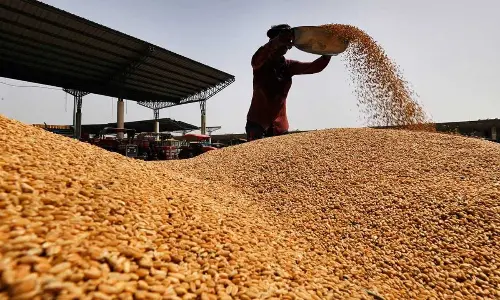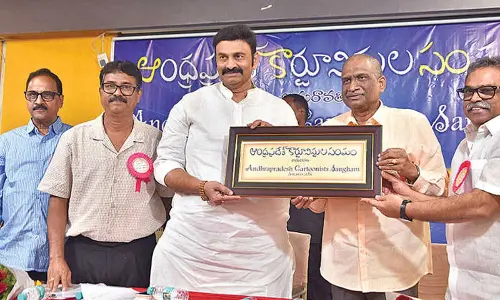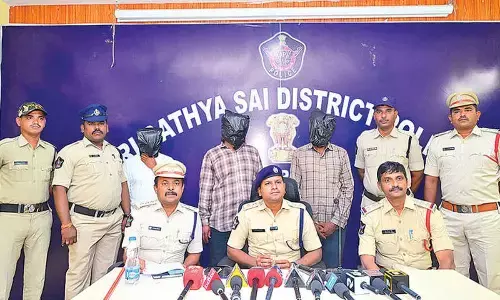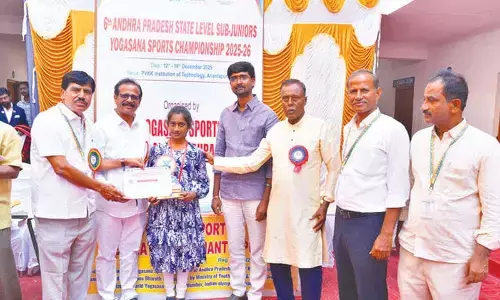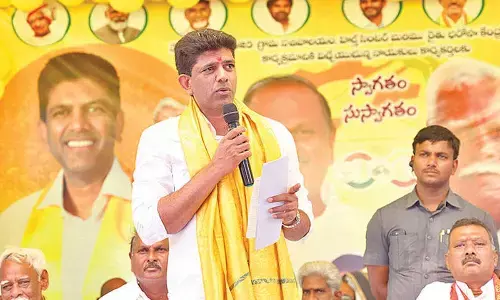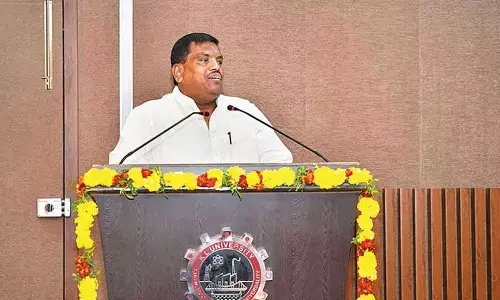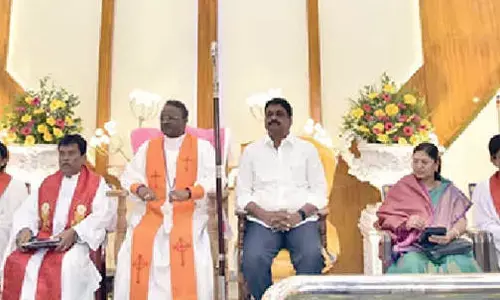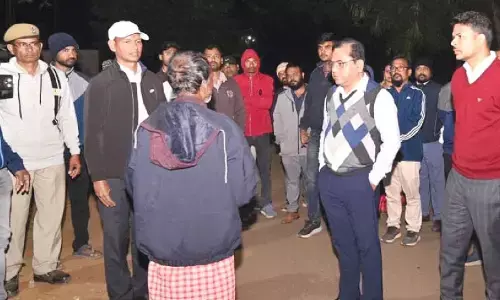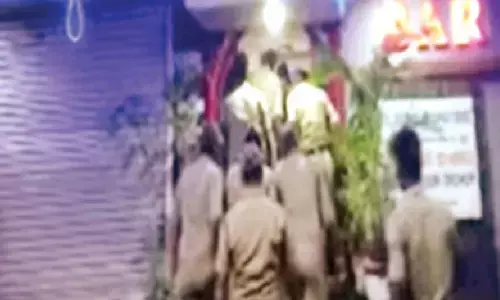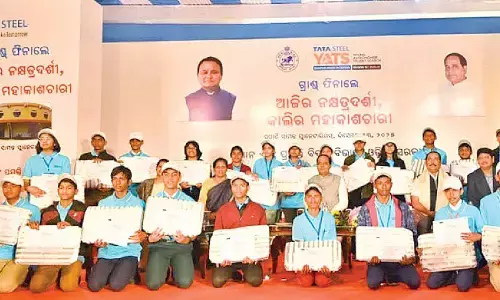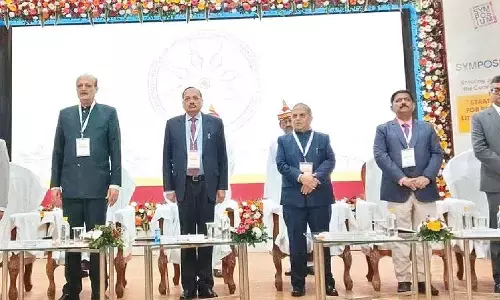Hyderabad as UT: A mockery of democracy

Asking for Union Territory is nothing but surrendering sovereignty of people. In seven Union Territories in India, the Administrator is the real ruler, and he continues to be more powerful even in Delhi, Goa and Pondicherry where Legislative Assemblies and Chief Ministers with Councils of Ministers are provided.
It is frequently asked whether two-thirds majority is necessary to form a Union Territory. As per Article 3 of Constitution, either a state or UT can be carved out of an existing state by a simple majority
.jpg) Asking for Union Territory is nothing but surrendering sovereignty of people. In seven Union Territories in India, the Administrator is the real ruler, and he continues to be more powerful even in Delhi, Goa and Pondicherry where Legislative Assemblies and Chief Ministers with Councils of Ministers are provided. When a woman in a moving bus is gang raped in Delhi, its Chief Minister expresses helplessness as powers over public order are vested in Union Government and not in her Government. In States the Governor is called a rubber stamp, but in UT, the Constitution itself converts a Chief Minister into a rubber stamp, reducing democracy to a mockery.
Asking for Union Territory is nothing but surrendering sovereignty of people. In seven Union Territories in India, the Administrator is the real ruler, and he continues to be more powerful even in Delhi, Goa and Pondicherry where Legislative Assemblies and Chief Ministers with Councils of Ministers are provided. When a woman in a moving bus is gang raped in Delhi, its Chief Minister expresses helplessness as powers over public order are vested in Union Government and not in her Government. In States the Governor is called a rubber stamp, but in UT, the Constitution itself converts a Chief Minister into a rubber stamp, reducing democracy to a mockery.
A Chief Minister in Union Territory will be the chief among all rubber stamps in the Council. De jure head ruler in UT is the President and de facto head is the Administrator. In the present scheme of administration of Union Territory under Part VIII of Indian Constitution and the Government of Union Territories Act 1963 (UT Act), the Legislative Assembly is a farce and the Council of Ministers is a nominal body of executive with all real powers vested in the Administrator and his final boss, the President. Here, even the role of the Union Council of Ministers is doubtful, as Article 239 says the Administrator can act ‘as he thinks fit’. The Government of Union Territories Act, 1963, Section 44 (3) says he can act in his discretion, and his decision shall be final (4) & (5).
If unfortunately Hyderabad is made a UT, the Governor of Andhra Pradesh will most probably be the Administrator, as Article 239 provides for appointment of Governor of adjoining state in that position of executive head of UT.
Hypothetically, Narasimhan, a former IPS officer, will be the Governor of both Telangana and Andhra Pradesh (because it is the capital for both States for ten years as per the CWC resolution) and also Administrator of Hyderabad UT. We will find three chief ministers standing in queue for his Darshan and signature on files, while he will be frequently going to New Delhi (like CM of any State including Kiran) to salute his boss, the President. The Administrator of a UT is more powerful than the Governor of a State, as he will not be just nominal head but real king under the Delhi sultanate.
Both the Constitution Article 239 AA and UT Act Section 44 give enormous powers to the Administrator and then to the President. Article 239AA (4) provides that in the case of difference of opinion between the Lieutenant Governor and his Ministers on any matter, the Lieutenant Governor shall refer it to the President for decision and act according to the decision given thereon by the President, and pending such a decision it shall be competent for the Lieutenant Governor in any case where the matter, in his opinion, is so urgent that it is necessary for him to take immediate action, to take such action or to give such direction in the matter as he deems necessary.
According to Section 44 of the UT Act of 1963, the Administrator can differ with the Chief Minister or Minister and have his way ‘as he deems necessary’; though he is under an obligation to refer it to the President, he still will be competent to decide in urgent situations.
It is frequently asked whether two-thirds majority is necessary to form a Union Territory. As per Article 3 of Constitution, either a state or UT can be carved out of an existing state by a simple majority. The Explanation appended to Article 3 makes it clear that ‘state’ includes ‘ut’, which means there is no additional difficulty in making a UT. For making UT out of an existing State, its legislature has to be consulted. But to make a State out of UT, the legislature of that UT need not be consulted because it is under rule of the Union and the Union itself decided to make it a State. This is the meaning of the second part of explanation to Article 3.
Another significant feature is: the Parliament has power, as per Article 239 AA (7) and (8), to change the provisions of a UT which will not be deemed to be the Amendment to the Constitution. Once a UT is formed, it will be left to the whims and fancies of the Union Government who can exercise executive and legislative power on all state subjects which is not possible if it is a state. The whole Constitution gets subverted ‘constitutionally’ in a UT.
Imposing President’s rule is a very difficult and complex process. But suspending power of Council of Ministers in UT is very simple, i.e., the President can issue a direction suspending any provision relating to the Council of Ministers as per Article 239 AB.
According to Article 244, the President has enormous powers to make regulations for a UT unless there is a legislature for that state. Even if there is a legislature which passes a law, the Administrator can reserve it for the assent of the President who might reject it, except in cases of money Bill. Even the Union Cabinet has no role.
While the Governor appoints the CM, the President appoints the CM and ministers who will hold office during the President’s pleasure. He can also make rules (Section 46) for allocation of business to ministers. The President can also suspend any provision of this Act during Emergency based on a report of the Administrator under S 51.
The Council of Ministers can aid and advise the Administrator and the Union Cabinet will advise the President generally, but the Administrator can simply override the advice while the President can act as he thinks fit. Thus, with reference to a UT, the role of democratic representative bodies, like the Council of Ministers, is almost ruled out.
As if the powers are not enough for the Union, the Parliament by Constitution (Seventieth Amendment) 1992 took away executive and legislative powers over public order, police, land and revenue from Delhi UT and vested them in the Union Government.
The writer is Professor & Coordinator, Center for Media Law & Public Policy, NALSAR University of Law, Hyderabad.


